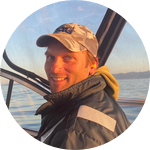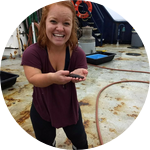About This Project
How significant an impact do keystone shark species have on fisheries? We’re still in the dark because we don’t really know their diets. By using precise eDNA and fatty acids techniques, we will be able to determine sharks' diet and feeding behaviors. This will allow us a window into the true impact these top predators have on their ecosystem, assisting conservation efforts and laying the groundwork for using these new approaches to help us understand our oceans worldwide.
Ask the Scientists
Join The DiscussionWhat is the context of this research?
Shark diet knowledge is based on studies using limited geographic range and traditional approaches which involve dissecting and analyzing stomach contents. These techniques leave knowledge gaps because often stomachs are empty, and contents are partially digested beyond recognition. Prey present that is identifiable only represents recently consumed prey from their most recent location. How do you identify something that's been partially digested? Consumed prey leaves traces of DNA, which can be identified through eDNA down to the exact species. Fatty acids can be used to identify habitat influences on recent shifts in diet. Using Salmon sharks as our test species, these analyses will provide one of the first in-depth data sets to accurately determine sharks’ diet and impact on ecosystems.
What is the significance of this project?
This study will assist in the advancement of standard practices used in feeding ecology studies, creating methodology that can be built upon and further developed. Using the novel approach of eDNA and fatty acid analyses will supplement current data sets, leading to the much-needed enhancement of current conservation and management practices.
We are using Salmon shark as our study species because as an endothermic predator, they have an extensive range, migrating from subpolar to subtropical waters. Evidence of their movements suggest they primarily prey on a variety of salmon and other fish species. It has been estimated that their consumption rates are much higher than previously thought. This indicates Salmon shark predation on endangered salmon stocks may have significant impact.
What are the goals of the project?
The goal of this study is to use the novel methods of eDNA and fatty acid analysis to understand the diet of sharks. eDNA will provide insight into what they have recently eaten while fatty acids reflect their diet over the past weeks to months. Stomachs will be flushed with water and tissue present collected. eDNA from the water and tissue will be extracted. Water eDNA will be run through a PCR and tissue eDNA Sanger sequenced to provide accurate species identification. Lipids will be extracted from muscle and liver samples to build fatty acid profiles. The difference in muscle and liver profiles will indicate recent shifts in diet and habitat. These will be compared against known profiles of other top predators. We will evaluate the similarities to determine habitat and feeding ecology.
Budget
The proposed budget will be used to purchase the eDNA extraction kits and filters necessary to process my water and tissue samples. The funds will be used to run the samples through a PCR, Sanger sequenced, and metabarcoded for analysis.
Funds will also be used to purchase the lab supplies needed to extract lipids, which will then be run through Gas Chromatography (GC) analysis and results will be analyzed and used to build fatty acid profiles.
The funds will be used to travel to other labs to learn the techniques needed for lipid extraction and eDNA analysis.
During the course of this project, the proposed funds will be used to support me as a Masters student and aid in the successful completion of this project.
Endorsed by
 Project Timeline
Project Timeline
I have begun collecting samples and predict the collection will be completed by early fall. I will then extract eDNA to prepare for PCR amplification and sequencing. I will test a few primers to find the best fit and plan on submitting them for sequencing at the start of the year. Next, I will focus on extracting and analyzing lipids for GC with the results being used to build fatty acid profiles. In the spring, I plan on using the fatty acid profiles and sequenced eDNA to begin data analysis.
Apr 18, 2023
Project Launched
Sep 01, 2023
Finish collecting eDNA and fatty acid samples from stomachs, muscle, and liver
Nov 01, 2023
Begin testing different primer sets and preparing for eDNA sequencing
Jan 01, 2024
Submit samples for sequencing
Feb 01, 2024
Begin processing fatty acid samples
Meet the Team
Reilly Boyt
Digging around in stomachs sparked my passion in feeding ecology, setting me on the path to becoming an emerging expert in stomach content analysis. I graduated with a B.S. in Marine Biology from Scripps Institution of Oceanography at the University of California, San Diego. I have worked on many diet studies over the last decade, on various species.
As an early career scientist, I have a unique perspective on diet analysis studies and expertise in traditional methodology. While appreciative of the strengths of traditional methods, I have a strong understanding of the gaps left by current processes and aim to address these in my research.
As a queer, disabled female, I encountered barriers while establishing myself as a shark scientist. I am aware of the difficulties in proving yourself as an underrepresented person in the field of science. Recognizing this, I founded Disabilities Within Ocean Sciences (DWOS), an organization and network focused on creating opportunities and resources for disabled, early career marine scientists. Still in its early stages, through DWOS I have become a powerful voice and a leader in diversity conversations within the field of ocean science, especially shark science. I have published work, led discussions and spoken on panels and teams discussing and facilitating disability inclusion. I strive to create inclusive environments and opportunities for aspiring shark scientists.
Project Backers
- 39Backers
- 107%Funded
- $14,585Total Donations
- $373.97Average Donation

